Things got complicated really quickly. Sometimes, when you plan for the long haul, you end up in a house that doesn’t have a functional kitchen sink, with a smoke-filled outdoors, cupboards covered in grime, no internet, no phone service, no car, four kids who are bored, a heat wave, all in the middle of a pandemic in a location where people don’t think the pandemic is real. To review, our goal was to build a regenerative agriculture farm that would be carbon negative, debt-free, off-grid, with diverse solar-based income, managed together by our family of six. We’d been inspired, done research, taken courses and felt we’d reached the limit of what we could do in suburbia. The next step seemed simple: find the land and sell our house…within the next few years.

Decked out in pandemic attire at the beach
Then COVID-19 hit. Our calendar went from bursting to blank in three days. From our privileged position of working-from-home and voluntary homeschooling, we watched as our friends, family, coworkers, and community members had their lives turned upside down. We “endured” a lack of playdates, museums, parks, in-person classes, and family shopping trips; others lost jobs and waited for unemployment checks to materialize while trying to figure out how to search for new jobs when their old jobs disappeared into the COVID economy. As we watched our world fall apart, the precariousness of our own situation struck home. We talked to a real estate agent and decided our best chance to achieve our goal was to sell our house immediately, before a potential housing market crash struck.
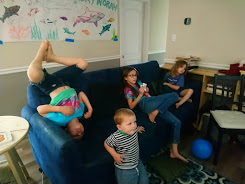
Bored inside 
Bored outside 
New format for all activities
How could we sell our house without selling out? We needed to get the highest price possible to achieve our goals, but we also wanted to sell our house in a manner that would be good for the neighborhood, the local community, and the environment. Rather than blanketing the front yard with water intensive lawn, we spent a five day weekend landscaping the front yard with drought tolerant California Natives. We left the interior of the house and remainder of the yard to the professionals.
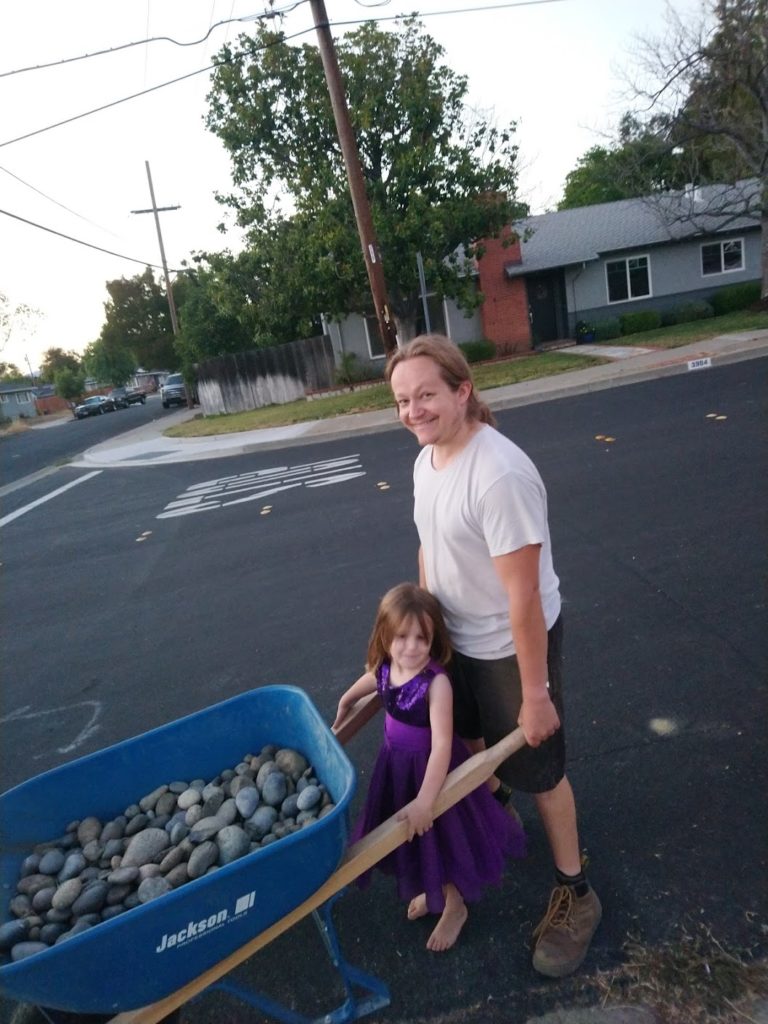
Moving rocks 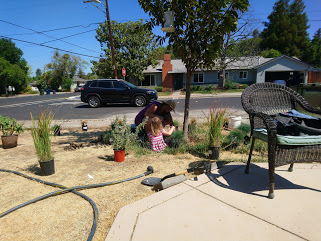
Planting 
Moving soil 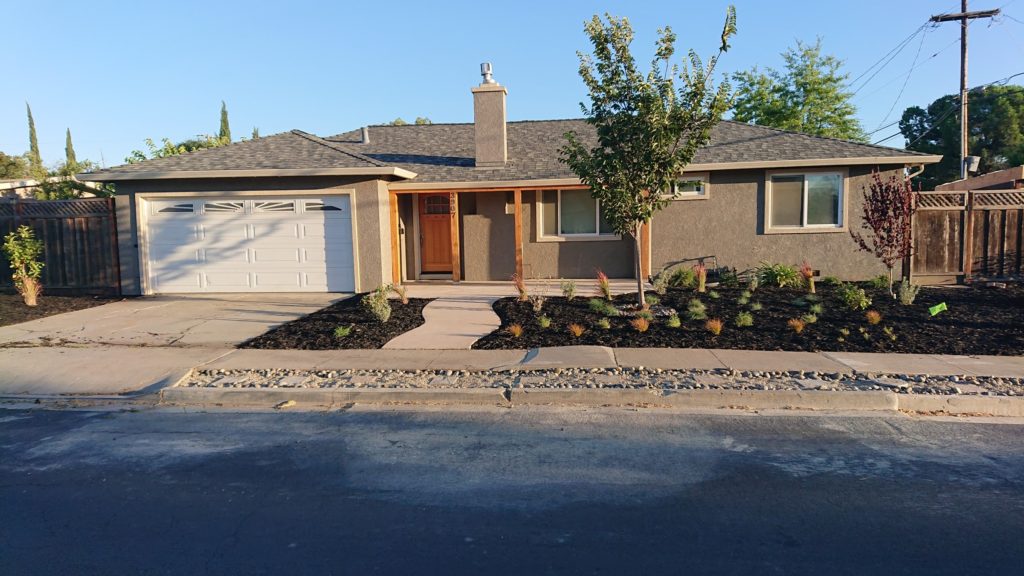
Relandscaped
Our next task was to organize, reduce, and pack our worldly possessions into boxes and out of the way of the professionals. We also needed to find a rental home to live in while searching for our dream property. Pretty straightforward. But it was August in 2020. Climate change has made the dry heat of California summers even drier and hotter. In the midst of record heat waves and planned power outages, we woke up to the ZAP – KAPOW – FIZZLE of lightning striking a transformer outside our window. We saw sparks outside and heard the fan motor stop and knew that we’d be packing and searching for housing without power until it came back on. That didn’t over eight hours.

Organizing our books
In our interim living situation, we needed enough space for all of us to sleep and live in, office space for Daniel to work from, and permission to keep our cats and laying hens. We wanted a place that could give us a sample of rural living, experience raising more animals, and enough space to bribe the kids into liking the move with a small amusement park’s worth of play structures. Initially, we looked at some rural places in Sonoma and Napa counties as well as the East Bay, but none of them felt right. On a lark, we looked at a place in the Central Valley. It had a large house on 10 acres, would allow us to keep all our animals and add more, we could get phone and internet service, and the price was right. We were sold. We signed the lease and started to schedule our escape from suburban life.

The “front yard” 
The “back yard”
Back at our old house, we continued to pack frantically and let professionals in to clean-up, landscape, and stage. 2020 struck again: The dry lightning storm that had taken out the transformer on our block had been one of a series and in the tinderbox conditions of California August, resulting fires merged into three of the largest fire complexes in history. Billowing clouds of smoke rolled across the entire western United States, and there were also freak rain showers which did nothing to slow the fires, but did slow down our outdoor clean-up efforts. Because in 2020, being wet and on fire at the same time isn’t too much to ask. We packed and kept the windows and doors closed and the kids inside and let the apocalypse rage outside.
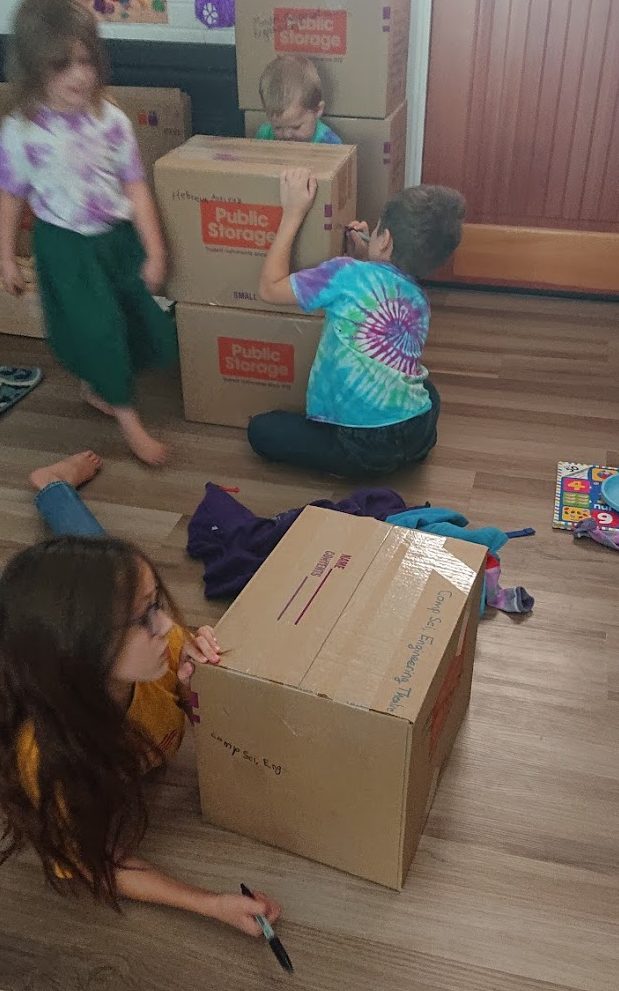
Moving day finally arrived. It turned out to be moving week and felt like every time we handled one obstacle, two more emerged hydra-style. Here it is, day-by-day:

Waiting for boxes
Day one: The smoke let up a little while we packed and handed off boxes and furniture to the movers. Our movers were fairly lax about using their masks. Miranda loaded the kids in the van and headed to the new place…which in addition to having no toys, also had no phone or internet service. As she waited for the movers and furniture, Miranda discovered that the grime on the surfaces in the kitchen required harsher chemicals than she had on hand. The movers showed up, unloaded, and she and the kids went to pick up Daniel from the old house. We were all hungry, exhausted, and without assembled beds, so we took refuge at Miranda’s parents’ house.

Chilling at the grandparents’ house
Day two: We left the kids with Miranda’s parents, while rented a U-Haul, and loaded the remaining boxes, outdoor furniture, small chicken coop, and 5 potted bamboo plants into the truck. As we drove over the Altamont Pass to our rental home with our load, traffic stopped. The Altamont Pass is a routinely and horribly congested commute route, but this was worse than usual. A semi-truck had swerved into the center median and split the cab in half. We made it to our new house an hour and a half later than expected, unloaded everything, headed back over the pass, and noticed that the other side of the freeway was still stopped. Three hours later, when traffic still stopped. We admitted defeat and spent a second night at Miranda’s parents’ house.
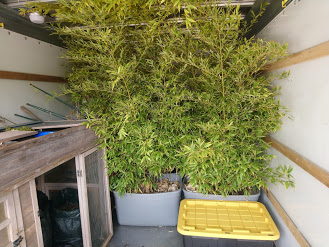
The U-Haul 
Watching the smoke roll in 
Ice cream at Bubbie’s
Day three: This was the first calm day. We let painters into our now-empty old house, and went to our new house. There, we started building a Suscovich chicken tractor for our flock, and reassembing the kids’ beds so we wouldn’t need to spend a third night at Miranda’s parents’. The day was relatively calm. We were still unsure if the well-water was safe to drink, we didn’t have a way to communicate with the outside world, the kitchen sink didn’t work, and we had no refrigerator or dishwasher, but we did get most of the way through the two critical builds and were finally able to sleep in our new home.

Making lap-joins, dancer-style
Day four: We woke up and finished the chicken tractor. Then we drove to pick up our 20 chickens from the old house and brought them home in four cardboard boxes. The larger problem that day was keeping up with communications from our real estate agent, stager, landscaper, and handy-man. We needed the internet as much as if not more than we needed a functional household water system and a refrigerator. Still, we could see the light at the end of the tunnel, all that infrastructure was coming within the next couple of weeks.

Boxed chickens 
The hens’ new home
Day five: Daniel had to go to work. Without internet or phone service, he had no choice but to take our only car to a shared office space for a day of teleconferencing. Miranda was left with the four kids, no car, no internet or phone service, only non-perishable food, and no tap water. That was the day the smoke turned the sky orange. Despite the apocalyptic outdoors, Miranda pressed on with unpacking and scrubbing down the house. Eventually gave up and allowed herself to be pinned under a cranky, stubborn, constantly moving toddler. Daniel came back at the end of a long day spent under an N95 mask. No-one else in the work-space would wear masks. We were starting to feel like moving had been a mistake, but figured that we had just a few more obstacles before the fun part of rural life began.

Reading “Chickens Aren’t the Only Ones” 
This does not capture the color. It was sepia orange.
Day six: Daniel had to go to the office space again. While he was gone, Miranda waited for AT&T to arrive and rescue us from life without internet service. AT&T came halfway through the day and declared there was insufficient bandwidth to meet our needs. When Daniel got home, Miranda dumped the bad news on him and took off to check her emails and texts. The housing market was booming. Our house sale would clearly exceed our wildest expectations, if we could only keep up with communications. The newly orange sky made a perfect backdrop to our elation over our house sale prospects mixed with depression over the shambles of our new living situation. We were about ready to admit defeat and go crawling back to the suburbs.

Girls trapped inside 
The kitty learning a new skill 
Boys trapped inside
Day seven: After our object lesson on the rural digital divide, Daniel solved our internet trouble with a trip to Verizon and cellular internet. Having communication with the outside world was bliss. Miranda spent the day cocooned in front of her computer texting and scrolling Facebook. In the midst of extreme self-doubt, the refrigerator arrived and the delivery person said exactly what Miranda needed to hear: “You got this.”
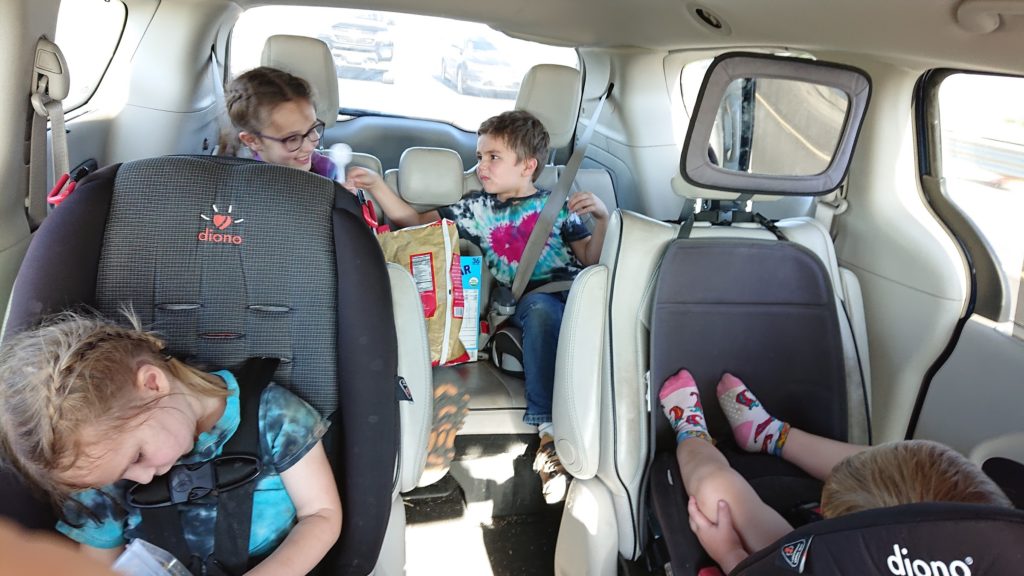
What happens during long car trips with four kids
The grand unfinish: Over the course of the next couple of weeks, we slowly crawled out of the pit of despair by adulting harder than we ever had in the course of having four babies. We brought in a plumber to fix the sinks. We cleaned the cupboards and counters. We unpacked. We got the water tested. We chose our buyer and closed. We replaced the windshield which had developed a spiderweb of cracks over the course of moving. And dealt with the recall for the part of the car that could cause it to spontaneously combust. We upgraded our Verizon situation so that videos and video calls were possible. We set up Daniel’s home office. Outside, the smoke cleared up enough that we were able to start enjoying this 10 acres that is temporarily ours. We still haven’t replaced the nearly bald tires, but we are researching bringing in goat, cows, and a puppy. This is 2020, what could go wrong?
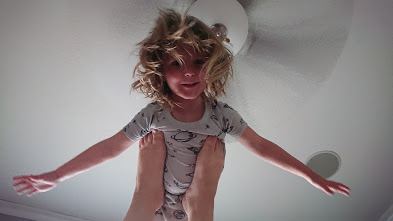
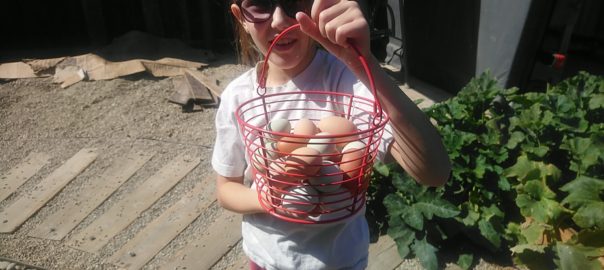
Loved the flow of this piece. Looking forward to more!
I LOVED EVERY WORD.AND I AGREE: “YOU GOT THIS…” SO GLAD YOU ARE KEEPING A RECORD OF THE AMAZING ESCAPE/JOURNEY AND THE PICS ARE GREAT…SENDING LOTS OF LOVE.